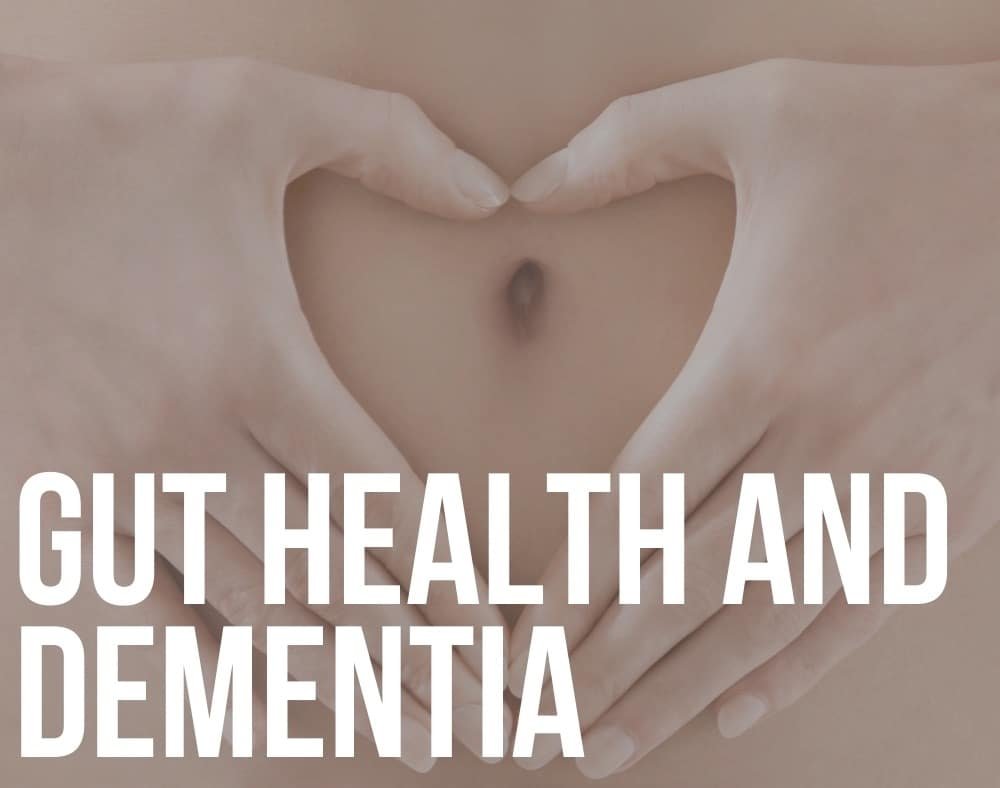For years, we have been looking into the connection between gut health and dementia.
This is in a bid to identify factors that CAN HELP reduce the risk of developing the progressive neurodegenerative disease.
Dementia is not an individual disease but a general term for loss of language, memory, problem-solving, and other thinking abilities that interferes with an individual’s day-to-day life.
Gut health, on the other hand, refers to a range of functions that the digestive system is responsible for.
This INCLUDES digestion, absorption of nutrients, production of hormones, and keeping a stable amount of bacteria, etc.
It has been proven both clinically and theoretically that poor gut health is one of the major causes of Alzheimer’s as well as neurodegeneration.
Connection between the Brain and Gut

Before digging deeper into the relationship between gut health and dementia, it interesting to learn about the gut-brain connection.
Almost everyone has had butterflies in their stomach or gut feelings.
The sensations that come from the belly suggest that the gut and brain HAVE a CONNECTION.
These two organs are connected both biochemically and physically in several ways.
The gut-brain axis refers to the communication system between the gut and the brain.
Other similarities the organs have include:
Presence of Neurons

Neurons are cells that are primarily found in the nervous system and the brain that instruct the body on how to behave.
The human brain has approximately 100 billion neurons.
Surprisingly, the gut has 500 million neurons that are connected to the brain THROUGH NERVES located in the nervous system.
The vagus nerve is one of the biggest nerves in the body that connects the brain and the gut. It sends signals in both directions.
A human study found that individuals with Crohn’s disease or IBS (irritable bowel syndrome) also experienced reduced vagal tone. Meaning that a person has reduced function of the vagus nerve.
Another mice study discovered that feeding the animals probiotics reduced the stress hormone amount in their blood.
However, after cutting the vagus nerve, probiotics did not have any effect.
It goes to show that the vagus nerve IS CRUCIAL in the gut-brain axis as well as its role in stress.
Neurotransmitters
The brain and the gut are also connected through neurotransmitters chemicals. The brain produces these to control emotions and feelings.
Fascinatingly, gut cells also produce many neurotransmitters.
Research indicates that the gut produces a huge portion of serotonin a neurotransmitter that controls the body clocks and contributes to feelings of happiness.
The Immune System
The immune system also connects the gut-brain axis. Gut and gut microbes play an ESSENTIAL ROLE in the immune system as well as inflammation.
This is though controlling what is passed into the body and the things that are excreted.
If the immune system stays switched on for too long, it can result in inflammation which is linked to various brain disorders such as Alzheimer’s disease and depression.
Certain bacterial make LPS (lipopolysaccharide) an inflammatory toxin that can cause inflammation when a lot of it passes to the blood from the gut.
It mostly happens when the gut barrier is LEAKY allowing LPS and bacteria to cross into the blood.
High LPS and inflammation are associated with brain disorders like dementia, schizophrenia, and severe depression.
Microbes

Although the brain does not have any microbes, the trillions of microbes that live in the gut make chemicals that affect how the brain functions.
Gut microbes produce tons of SCFA (short-chain fatty acids) that affect how the brain works, for instance, reducing appetite.
This is because they produce SCFA by digesting fiber.
Experts agree that a healthy diet alongside lifestyle factors plays a major role in decreasing dementia risk by about a third.
Microbiome
Some professionals as a way of finding out how this is possible opted to study the gut microbiome. Which are the trillions of microorganisms that live in the human digestive tract.
Researchers discovered that certain changes in these bacteria are linked to several autoimmune and inflammatory conditions like diabetes, obesity, and inflammatory bowel disease.
Scientists also revealed that some kinds of microbiome bacteria can promote the build-up of tau and amyloid proteins. These proteins are linked to Alzheimer’s disease (AD) one of the most common causes of dementia.
Mouse studies confirmed that dietary changes can alter the microbiome which can lower inflammation, reduce amyloid plaques and in turn enhance memory.
Lipids
There is also research suggesting that an individual’s ability to metabolize specific lipids can increase the risk of developing Alzheimer’s.
Lipids can be described as fat-like substances found in the body tissues and blood that make up most of the human brain.
Senior Director of Medical and Scientific Operations at Alzheimer’s Association Heather Snyder said that if a person’s body has challenges moving around lipids, it may end up impacting the structure and function of the brain.
Let’s look at some of the studies that have been conducted regarding the connection between gut health and dementia and their implications.
Studies Supporting the Connection between Gut Health and Dementia

Several studies have been conducted to reveal the relationship between various types of dementia and gut health.
Below we look at some of the research that has been making headlines in the dementia world.
1. Impact of Lipids
Two studies sought to discover the impact of lipids on the risk of developing Alzheimer’s. One of the studies was carried out at the University of California.
The researchers studied 800 seniors some with full-blown Alzheimer’s, others with mild cognitive impairment, and others healthy.
They discovered that the participants with Alzheimer’s also had numerous issues with lipid metabolism like having a hard time absorbing the lipids that contain DHA and EPA.
Researchers tried to give this group of people fish oil supplements, but this action did not bring the lipids back to normal.
The other study was conducted by researchers from Duke University and the University of Pennsylvania.
They discovered that LOW levels of various lipids and plasmalogens are linked to a HIGHER RISK of Alzheimer’s.
Both studies seem to indicate that when the human body does not produce certain lipids, it will also impact what is going on in the brain.
2. Can Gut Bacteria Help in Dementia Diagnosis and Treatment
Researchers in Japan conducted a study to determine whether, in the future, gut bacterial may help in diagnosing dementia and perhaps even treatment.
The team of scientists was led by Dr. Naoki Saji from National Centre for Geriatrics and Gerontology in Japan. The researchers recruited 128 participants from a memory clinic.
All the participants underwent cognitive ability assessment and the professionals also used MRI to scan their brains. Some people had dementia while others did not.
To look for differences between the two groups, the scientists analyzed stool samples. The researchers found several differences.
For example, feces collected from people with dementia recorded higher levels of phenol, ammonia, skatole, and indole. The group also had major changes in the levels of some gut bacteria.
Even though this was a small study, the authors concluded that gut microbiota is a strong and independent dementia risk factor.
More research needs to be conducted on this angle to determine the link between gut health and dementia.
Foods that can Help Improve Gut Health and Dementia

Maintaining gut health may be instrumental in preserving brain health.
Certain food groups are beneficial for the gut-brain axis and some of them include:
Fermented Foods
Cheese, yogurt, sauerkraut, and kefir contain HEALTHY microbes that can alter brain activity.
Omega-3 fats
Studies in animals and humans show that omega-3s that are mostly found in oily fish increase good bacteria in the gut and can reduce the risk of brain disorders.
Polyphenol-Rich Foods
Green tea, cocoa, coffee, and olive oil are some of the foods that have high levels of polyphenols.
These are plant chemicals that increase healthy gut bacteria and can also enhance cognition.
Foods Rich in Fibre
Examples of these include nuts, whole grains, fruits, seeds, and vegetables that contain prebiotic fibres good for gut bacteria.
Prebiotics are also known to reduce stress hormones.
Implications of the Studies

While the research looking into the relationship between gut health and dementia is still in its early stages, it may be a game-changer when it comes to developing better diagnostic tests for dementia in the future.
It may also offer professionals a better perspective on why some people will experience fast progression over a year while others will go through a slow progression over 15 years.
Additionally, people are advised to take care of their gut health. This will not only make them feel better but can also avoid different types of dementia and neurodegenerative diseases according to Dr. Floyd Minana D.C.

